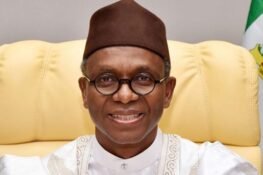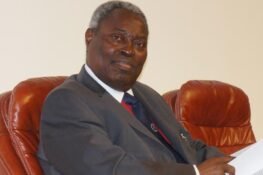The Wild Wild West is an iconic TV series set in the 1800s, depicting a turbulent period in American history when savages took advantage of the push for a westward expansion of territory as a “Manifest Destiny” of European Americans.
The drama portrayed good men trying to frustrate the plans of megalomaniacal villains in the melee that followed the Spanish-American war.
Nigeria is in a transformative phase comparable to the Wild West because of beasts in our midst who wield AK-47 assault rifles, taking over the country while good men ponder what they could do to resist.
The Wild West involved brute force to lay claims on territory, strength to weaken resistance and wickedness to discourage the courageous.
As lawless American cowboys thrived in the middle of chaos, they left a trail of gut-wrenching crimes like we now see in Nigeria.
Wild West has been used before in the context of Nigerian politics.
It described the lawlessness in Western Nigeria during the 1960s, when the political system became tempestuous as a result of disagreements between rivals.
As the Action Group of Obafemi Awolowo confronted Ladoke Akintola’s Nigerian National Democratic Party (NNDP), law and order crumbled, giving way to anarchy, likened to the US Wild West.
Political thugs took over the streets of towns and cities in the former Western Region, upending order, as they lit the homes of political opponents to establish strongholds and territories.
Western Nigeria remained in the state of lawlessness until the first military intervention in 1966. In fact, “Operation Wetie” became one of the causes of military intervention in politics.
Figuratively, Wild West means brutality, sadism, loss, sorrow and anguish to everyday people.
Had Boko Haram been the only source of insecurity in Nigeria, it would have been “great.”
It also means the survival of the fittest, every man for himself and a disregard for law and order.
It is a state of barbarity where normal governance has failed and the violent rules over law-abiding citizens.
Social justice is suspended at the whims of the strong and everyone watches helplessly as their rights are usurped when a new order is imposed by those using force to grab space.
If you live in 2021 Nigeria, you would understand the Wild West because that is your experience.
Three successive administrations have been battling terrorism for a period of nearly 20 years.
Billions of dollars has been spent on a problem that has only gotten worse under the present regime.
Boko Haram terrorists have successfully bombed the headquarters of the Nigerian Police, the United Nations, numerous churches and mosques and many institutions that are revered.
Had Boko Haram been the only source of insecurity in Nigeria, it would have been “great.” Boko Haram is no longer the main security threat.
It is the disorganised nomadic pastoralists walking all over Nigeria with AK-47 rifles.
They have no respect for the law or the sanctity of human lives and are terrorizing citizens through murders, kidnapping, armed robbery and other crimes.
Armed with guns that ordinary Nigerians are forbidden to own, these criminals are expanding their frontier while the government looks on.
They kidnap, torture and murder children, clergymen, royalty, and now, military officers.
Most of us call them bandits, but I wonder if they see themselves as bandits.
They may place economic claims on their victims, but the so-called bandits have been making political and territorial claims as well, backed by institutions and prominent politicians.
The criminals have penetrated all parts of Nigeria, shutting down school systems and placing communities in a lockdown.
Acting stone deaf, President Buhari is moving forward, caring less about alienating those alleging a Fulani expansionist agenda
The Fulani herdsmen situation has gone too far – to the extent that the spiritual head of the Fulani ethnic group, the Sultan of Sokoto, Alhaji Mohammad Sa’ad Abubakar III, admitted that at least 80 per cent of the criminals are his kinsmen.
The Sultan was being brutally honest at a time when the Financial Times reported that the national coordinator of the international Fulani organization, Tabital Pulaaku, Abubakar Umar Girei, said herdsmen are just stigmatized.
Girei represented the avoidance thinking among most of those who could help bring the problem under control. J
ust in the last week, the Sultan has again raged that there is no national dialogue on the issue.
Among those who believe in the stigmatization theory is the President of the republic, General Mohammadu Buhari, a Fulani, who has failed to use his office to take control in his six years in office and has railed against a critical look at the problem.
Nigerians have been asking when President Buhari would show any concern to prove that he sympathises with the victims of the expanding crime.
Strangely, the president’s words and body language give the impression that he approves of the wildness in the country he manages.
The past six years of the Buhari administration have been ones lived in insecurity, as farmers clashed with nomadic gunmen in the Middle Belt, West and East. The president keeps mute even as he pushes through open grazing legislation that is clearly disliked.
Cries of manipulation and oppression are turning to demands for restructuring and secession as the affected parts of the country asked for the expulsion of the Fulanis from their states.
While people agitated, the only response from the Buhari regime has been Ruga settlements and the re-introduction of a colonial-era law that allowed open grazing in parts of the country.
The governors of the 17 states in the South, operating under the Southern Governors Forum, had earlier banned open grazing in the region, while Rivers State went further by making it into law.
Influential southern groups such as the Afenifere, Ohanaeze Ndigbo and the Southern Nigeria Frontier, have also rejected grazing reserves.
Acting stone deaf, President Buhari is moving forward, caring less about alienating those alleging a Fulani expansionist agenda.
Many say Buhari is using federal power to finish the job that Uthman Dan Fodio could not complete two centuries ago.
In the early 19th Century, the Fulanis raided other ethnicities and permanently subjugated the Hausas and other minority ethnic groups in the north, including territories formerly ruled by the Yoruba states.
At times, the apprehension of the victims of banditry seem disproportionate to the threat as some southerners now see any northerner as a Fulani herdsman.
But a sense of the jihadist history fuels fears of Fulani expansion and occupation.
When bandits have the audacity to attack the elite Nigerian Defence Academy (NDA), kill and kidnap military officers as they did last week, the president can guess how he will be judged
It is such sentiments that regional agitators such as Sunday Igboho and Nnamdi Kanu have used to galvanize support for defensive and secessionist causes.
Nigerians, who have waited six years to hear a sympathetic tone from President Buhari, have kind of given up.
This President has all but lost the opportunity to prove he is anything but a sectional president.
He never condoles the victims of criminals; behaving as if he does not care.
President Buhari said recently he does not want to leave as a failed President-when he is no doing much to help himself. He has largely sacrificed his legacy to a stubborn refusal to act as the father of the nation.
By taking sides, Buhari has contributed to the crippling of the economy and will, at best, end up as a not-so-great president.
When bandits have the audacity to attack the elite Nigerian Defence Academy (NDA), kill and kidnap military officers as they did last week, the president can guess how he will be judged.
He has failed because the criminals that he failed to rein in have now descended on the institution that we trust more than any other to protect us.
Left to roam, bandits have become better fighters than soldiers under Buhari’s watch.
If the military can no longer protect themselves, who will protect the ordinary citizens?
The attack is symbolic of the fact that no one is safe anywhere in Nigeria.
It means we now live in a wild country where Fulani bandits can take anything they want. They have already taken over large swaths of northern Nigeria. The rest is theirs to take.
Welcome to the wild, wild Nigeria. Open for grazing. Open to bandits.








